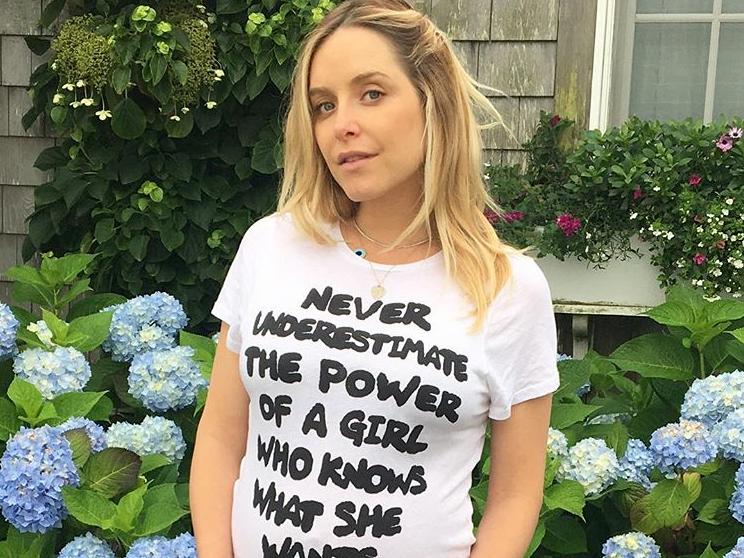Jenny Mollen, an actress and bestselling author of Live Fast Die Hot, has been publicly celebrating her pregnancy on Instagram since April. But last week, she got real about her struggle with prenatal depression.

The celeb, who also has a three-year-old son with her husband Jason Biggs, posted a bathroom selfie to the social media site with the caption: “Prepartum Depression… it’s what often happens to expectant moms who are awake in the world.”
In her subsequent Instagram story, Mollen apologized and said her condition was likely “chemical.”
“I could already be in a depression; I’m sorry, but it’s true. I think that it’s chemical. I think that people don’t talk about it enough, so I guess I’m preparing myself now.”
Having suffered postpartum depression following her last pregnancy, the author stressed the importance of ignoring the judgment of others and seeking help.
WATCH BELOW: Chrissy Teigen opens up about her battle with postpartum depression

“You’ll be shocked how fast you can just wake up one day and be in the darkest place and think, ‘What’s wrong with me? I’m a new mom. I should be so happy. Everybody else is telling me how lucky and happy and amazing things are,'” she said. “Don’t buy into that s***. If you feel bad, please get help.”
Earlier in her pregnancy, she also revealed that she has placenta previa, a condition in which the baby’s placenta partially or entirely covers the cervix, which can cause severe bleeding in pregnancy and delivery.

Get weekly health news
“I just want you to know whatever you’re feeling right now, like, if you’re waking up in the middle of the night with night terrors or dreaming about your dead dog or picturing your house on fire, that you’re not alone,” she said. “It’s very normal.”
- Bombardier warns of ‘significant impact’ to travellers from Trump’s threat
- Can Trump decertify aircraft? What experts say amid Bombardier threat
- Canadians have billions in uncashed cheques, rebates. Are you one of them?
- Head-Smashed-In Buffalo Jump heritage site enjoys boost after shout out on ‘The Pitt’
Dr. Jillian Roberts, a psychologist and associate professor of educational psychology at the University of Victoria, says stress plays a large role in prenatal depression and anxiety. (The Public Health Agency of Canada estimates that 10 per cent of women experiences depression in pregnancy.)
READ MORE: Experiencing anxiety or depression during pregnancy? There will soon be an app for that
“When you think of a pregnant woman, she is undergoing a lot of physical and biological stress, and depending on her circumstances, she could also have familial and financial stress. If that woman already has a predisposition for depression, that’s a perfect storm that could land her in a very low place,” she tells Global News.
She says that prenatal depression and prenatal anxiety are “two sides of the same coin,” and that hormonal changes, as well as the pressure of impending parenthood, are the key factors at play.
Some warning signs of prenatal depression or anxiety include tremendous expressed worry or preoccupation for the health of the baby, weepy and sad feelings, irritability, lethargy, pessimism, preoccupation with dark thoughts, and under or overeating.
And although a woman who experiences prenatal depression isn’t guaranteed to also go through postpartum depression, Roberts says there is a definite risk.
READ MORE: ‘How could she not know?’: When women don’t know they’re pregnant until they give birth
Most importantly, however, women who believe they might be suffering from prenatal depression or anxiety should speak up immediately and seek help.
“Talk to your primary care physician about any symptoms you may be experiencing and allow them to guide you through treatment options. There are some safe antidepressants that can be used during pregnancy if it’s a serious case,” she says. “A woman doesn’t have to sit there and suffer.”
If you or someone you know is in crisis and needs help, resources are available. In case of an emergency, please call 911 for immediate help.
The Canadian Association for Suicide Prevention, Depression Hurts and Kids Help Phone 1-800-668-6868 all offer ways of getting help if you, or someone you know, may be suffering from mental health issues.










Comments